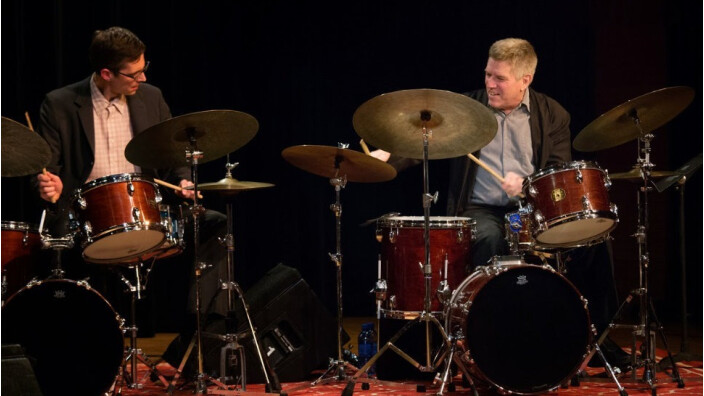Today I invite you to discuss a somewhat particular topic in this chapter dedicated to recording drums.

For a change, I’ll start with a brief listening session of two recordings made exclusively with the Mono Room mics:

- RoomM A 00:28
- RoomM B 00:29
Apart from the rhythmic mistakes – I intentionally did no editing to keep the takes as “raw” as possible –, you’ll easily realize there is a great difference between the “A” and “B” clips. However, besides the identical pattern, I swear that they were recorded the same day one after the other, in the same place and with the exact same technical conditions, i.e. same drum kit, mics, preamps, and converters. Why do they sound so different? Well, it just so happens that I had the luck of having not one but two drummers for this session! Indeed, as some of you have probably found out thanks to the acknowledgments of this chapter, the sound engineer in charge of these takes is also an experienced drummer. So we decided to take advantage of this fortunate situation to illustrate something that is unfortunately too often hidden behind the technical coldness of most of the writings found on the internet – including this site – discussing the subject we are dealing with in this series, namely the effect of a musician on a recording!
The gear you use, the way you use it and the place you record in certainly play a part in the recording, just as the settings of the instruments, the arrangement of the song and even its tempo affect the final outcome. But at the end of the day, the single most important factor is the musicians themselves!
This applies to all instruments. And yet, the importance of the interpretation is, in my opinion, too often neglected when in fact it should be the cornerstone of every single recording. And I didn’t just randomly choose the chapter dedicated to recording drums to speak about this. True, the fact that I had two drummers at hand certainly helped me illustrate my point with audio examples, but I would’ve nevertheless chosen to mention this right here because it is coincidentally the drums where the musician factor is more often neglected. And I’m not talking here about the replacing of a drummer with a drum machine, because I consider the latter to be an instrument in its own right. I’m mostly referring to the excessive use of virtual instruments to simulate acoustic drums. Don’t get me wrong, the possibilities this opens are amazing and you’d have to be crazy not to take advantage of it. But, if you ask me, the feeling of a musician is simply inimitable. Wouldn’t it be a pity to deprive yourself from it?
To finish, I’ll just add that having both of them, a drummer playing virtual drums with a MIDI kit, is definitely not out of the question. It can actually be very helpful to get more than decent results for anyone who wishes to preserve the feeling of the drummer while lacking the necessary technical conditions to make a proper recording. Now you know…
P.S. I know this article might raise some controversy. But that’s the whole point: to openly discuss the topic. Let the discussion begin!



